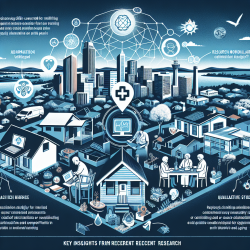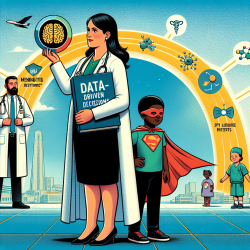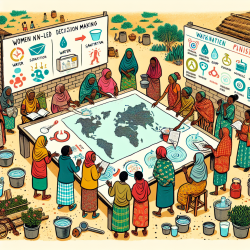In today's rapidly evolving healthcare landscape, the integration of technology into health services is becoming increasingly crucial, particularly in remote areas. A recent study titled "How Geographical Isolation and Aging in Place Can Be Accommodated Through Connected Health Stakeholder Management: Qualitative Study With Focus Groups" provides valuable insights for practitioners looking to enhance their skills and better serve isolated populations.
Understanding the Study
The study explores the challenges and strategies involved in implementing Connected Health (CH) in remote areas of Taiwan. By conducting in-depth interviews and focus groups with 22 participants from various health institutions, the researchers identified key stakeholders and their interests, as well as the barriers and facilitators to effective CH delivery.
Key Findings and Practical Applications
Here are some of the study's significant findings and how they can be applied in practice:
- Stakeholder Identification: Recognizing the key players in the CH ecosystem is crucial. These include government sectors, industrial players, academic researchers, and end users. Understanding their interests and power dynamics can help in formulating effective strategies for CH implementation.
- Communication Management: Developing a robust communication plan is essential for engaging stakeholders. This involves identifying communication constraints, determining the information to be communicated, and choosing the right methodologies for communication.
- Leveraging Competitive Advantages: Health facilitators in remote areas should identify their unique strengths and use them to negotiate better terms with industrial players and other stakeholders. For example, remote settings can serve as ideal locations for testing new CH products and services.
- Addressing Conflicts of Interest: Transparency in disclosing conflicts of interest and understanding the different priorities of stakeholders can help in building trust and cooperation. Government sectors may focus on political achievements, while industrial players might prioritize economic benefits.
- Data Development for Risk Management: Strategic planning about how data can inform risk management is crucial. This involves analyzing health data to identify potential risks and opportunities, which can then be used to inform decision-making processes.
Encouraging Further Research
The study highlights the need for ongoing research to optimize stakeholder engagement and improve CH implementation in remote areas. Practitioners are encouraged to delve deeper into the study's findings and consider conducting their own research to address specific challenges in their regions.
To read the original research paper, please follow this link: How Geographical Isolation and Aging in Place Can Be Accommodated Through Connected Health Stakeholder Management: Qualitative Study With Focus Groups.










